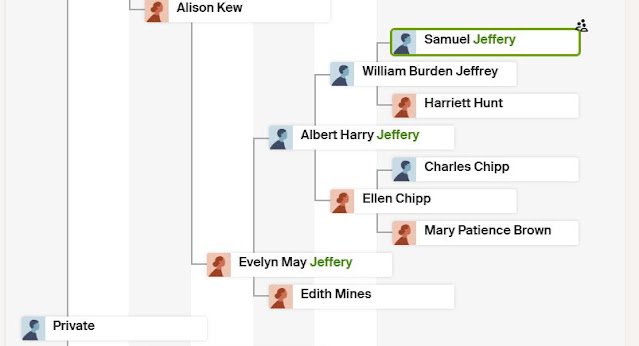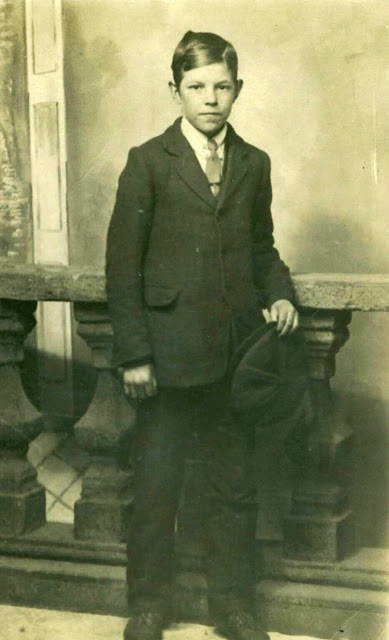The Gadsby Family Ancestors and Cousins
This blog contains some earlier posts from my blog The Edge of Snowdonia. When I have transfered the old posts I will review them and add updates and other discoveries.
Friday, 2 May 2025
How Do We Find the Stories of Our Ancestors and their Family
Monday, 4 November 2024
How identifying DNA matches has helped me improve my family tree Part 2 Looking at every record
Review Everything
My gt grandfather was born in Warminster Workhouse, his mother was unmarried and was born in Fisherton Delamere and living there in 1841, so she would have been expected to have her settlement as this parish, which would be part of the area covered by the Wilton Workhouse.
However we do not find her in Wiltshire in the 1851 census. She has moved to Sherborne, Dorset and is employed as a Silk Winder.
It is possible that before her son was born she had moved to Warminster for work as this town also had Silk Mills.
So who was his father?
DNA matches have proven to be helpful in confirming the research discovered in the records available.
I attended a zoom talk on 29th October and one of the tips was to organise your matches into groups by looking at shared matches.
I have 2 unknown fathers at 2xgt grandparent level in the maternal side of my tree. Once I had assigned those I had confirmed as descendents of known relatives I was left with a number of unknowns which I grouped together.
On 30th October I started looking at how some of them might be connected. I had a number of them who had the surname Jeffery or a variant in their tree.
Were they connected? Could this be my missing link?
One in particular stood out.
The Samuel Jeffery in this tree was living at Middle Mills Sherborne, Dorset in 1851 he was a widower and a Carpenter.
I did some investigating and added more sources to the Family Search tree before moving to add anything to Ancestry.
During this research I came across marriage banns in July and August 1854.
Having made this final discovery I added Samuel as a likely father.
I now have more DNA matches that are linked to this family.
William was not the son of Harriett Hunt his mother had died before he appeared on the census records.
William Burden Jeffery's birth was registered in the Oct-Nov-Dec quarter of 1848 in the Sherborne district Mother's maiden name: Burden.''GRO Reference:'' 1848 Oct-Nov-Dec in Sherborne Volume 08 Page 91.
William had a brother Frederic who is in a tree of someone who is a match and he has the correct mother,
his descendants are showing up as matches.
I have been slowly adding to this family but being careful to ensure I have the correct family.
One of the key things here was deciding whether it was likely that Samuel and Martha had met. The fact that they were working in the same industry, in the same town, at the same time, was crucial in taking that final step.
Monday, 13 February 2023
Why take a DNA test!
This may require several posts but I will start by saying why I took my first DNA test which was with Living DNA.
The Living DNA test would give me a better idea of where my genetic origins lay in England. I was expecting it to be largely in the Southern counties where I knew my family had lived for a couple of centuries or longer.
Below is the current breakdown.
Great Britain and Ireland 94.9%
South Central England 50.6%
Southeast England 14.3%
South England 11.6%
Devon 8.5%
East Anglia 6%
South Wales 1.4%
Cornwall 1.3%
Orkney and Shetland Islands 1.1%
Europe (North and West) 2.8%
Northwest Germanic 2.8%
Europe (South) 2.3%
East Iberia 1.1%
Tuscany 1.1%
Sunday, 26 January 2020
52 Ancestors Close To Home
Monday, 20 January 2020
52 Ancestors Long Line
Here are the profiles for George Wiltshire his father and William Wiltshire his grandfather.
Monday, 13 January 2020
52 Ancestors Favorite Photo
Do I have a Favourite?
Saturday, 4 January 2020
52 Ancestors Fresh Start
So if you are looking at records in the 1750s make sure you consider the changes that took place. Changes to the start of the year and the start of recording more information when couples married.
How Do We Find the Stories of Our Ancestors and their Family
Every Story Matters I have taken this title from the message of the opening keynote talk for the 2025 Guild of One Name Studies Conference ...

-
WHY DID I START RESEARCHING OUR FAMILY HISTORY? My Introduction to Genealogy In this first post, I will be writing about how and ...
-
Every Story Matters I have taken this title from the message of the opening keynote talk for the 2025 Guild of One Name Studies Conference ...
-
Invite to Dinner Rather than discuss who I would invite to dinner I have decided to discuss a meal our family had to celebrate my gra...









